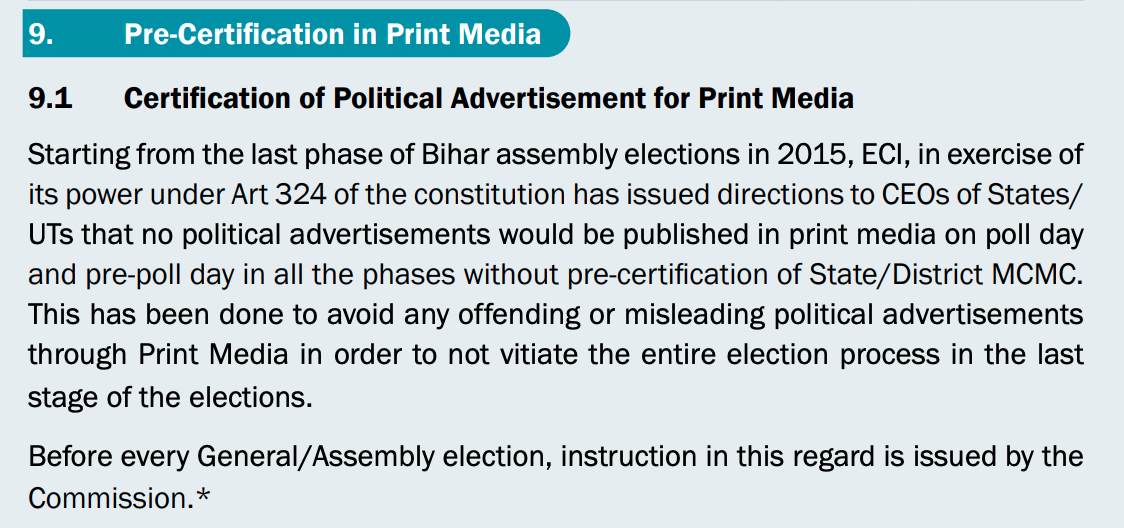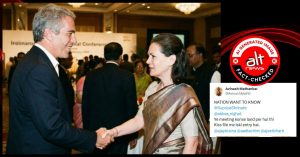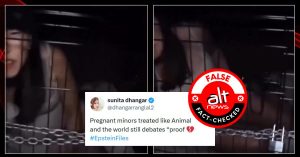The Bharatiya Janata Party is back in power in Delhi after 26 years. It won in 48 of 70 Assembly constituencies, defeating the Aam Aadmi Party by a major margin.
While the reasons for BJP’s win are multi-fold, campaigning and political ads also played a role in shaping electoral perspectives. From artificial intelligence to misinformation and name-calling, these political ads went all out.
Interestingly, on the day of polling (February 5), several newspapers in Delhi ran full-page BJP ads with images of Prime Minister Narendra Modi, urging voters to cast their ballots in favour of the party. The reason this is striking is that this happened during the silence period mandated by the Election Commission of India (ECI) guidelines. A ‘silence period’ refers to the 48-hour window before polling and until voting concludes during which all campaigning activities—such as rallies, advertisements, meetings and political events—must cease in polling areas. This is part of the ECI’s model code of conduct (MCC) to ensure free and fair elections. The ECI’s guidelines say no campaigning must be carried out across mediums.
So, those going to cast their votes on February 5 likely saw the political ads in their morning papers before they stepped out to cast their ballots, which is, at least in principle, contrary to the idea of free and fair elections. The larger purpose of a silence period is to give voters the time and space to evaluate candidates and their parties based on what they have seen and heard and make up their minds on the final day without being constantly nudged by political messages.
For the Delhi Assembly elections, the ‘silence period’ was effective from 6 PM on February 3 till 6 PM on February 5.
Silence Period….. #DelhiElections #DelhiElection2025@ECISVEEP pic.twitter.com/P7BPAEU1kR
— CEO, Delhi Office (@CeodelhiOffice) February 3, 2025
Alt News already wrote about how the BJP flouted this rule by running political ads during this period on the its official Facebook page on February 4. Read: BJP Delhi’s official Facebook page violates EC’s silence period rule.
By that logic, the following newspaper advertisements must have also flouted EC’s guidelines. But there’s a caveat. More on that later; first let’s look at the papers that carried these ads.
‘Janta Ka Vikas Modi Ki Guarantee’
We sourced epaper copies of major leading dailies and checked their Delhi editions during the silence period. Many of these carried full-page BJP ads with Modi’s image that said “Janta Ka Vikas Modi Ki Guarantee”. Few papers also carried ads by the Congress.
The Indian Express’s Delhi edition had a full-page BJP ad on February 5 and a smaller ad on the front page in the panel below the masthead on February 4.
Meanwhile, The Times of India had both a full-page BJP ad on its jacket and a half-page Congress ad on Page 1.
The Hindustan Times too carried the same BJP advert on its front page on February 5. The daily had a half-page Congress ad on February 4.
BJP’s ads also featured in HT’s Hindi counterpart Hindustan on February 4 and 5.
Among other newspapers that carried BJP ads prominently during the silence period were Navoday Times (Hindi), Amar Ujala (Hindi), Dainik Jagran (Hindi) Navbharat Times (Hindi) and The Pioneer (English).
Screenshots of their front pages are in the gallery below:
What do ECI guidelines say?
A January 7 press note outlining general and legislative assembly election procedures for the Delhi polls explicitly says that all political parties must “observe the silence period on all forms of media as envisaged under Section 126 of the R.P. Act, 1951“.
Now, here’s what one of the provisions related to elections and advertising in Section 126 of the Representation of the People Act, 1951, says:
“Political advertisements on any election matter in TV, cable networks, radio, cinema Halls, use of bulk SMS/voice messages, audio visual displays in any polling area during the period of forty-eight hours ending with the hour fixed for the conclusion of the poll for any election in the polling area is also prohibited. Political advertisements related to election matters, even if disguised in another form, like ads masquerading as news items/headlines, are strictly prohibited from being displayed during the silence period in the polling area, regardless of prior scheduling.”
Further it says:
“No person shall convene, hold, attend, join, or address any public meeting or procession related to an election, nor display any election matter to the public through cinematographs, television, or similar media. Additionally, organising or arranging musical concerts, theatrical performances, or any form of entertainment or amusement aimed at attracting the public for election-related purposes is prohibited in any polling area during the 48-hour period leading up to the conclusion of the poll”. It also says that any person who fails to adhere to these guidelines can face imprisonment for up to two years, a fine, or both.
While one can argue that in spirit the silence period rules do apply to print media just as well as any other mediums; legally, the Act does not clearly specify hold print media and advertisements in newspapers accountable. Other mediums have been clearly spelt out but print media has not.
The same view was also reiterated by former Chief Election Commissioner N. Gopalaswami. When Alt News reached out to him for comment, he said that if the ECI had not taken any action on this, clearly there was no breach of law.
“The fact that parties still manage to place advertisements in newspapers on voting day is due to a lacuna in the law and till the time it is rectified this anomaly would remain… The Act pertaining to the electronic media came later. In that Act, there was a provision (for not displaying advertisements in the silence period). The earlier provision, which pertained to print media, remained as it is,” Gopalaswami had told The Wire in 2019.
In January 2019, after several violations of Section 126 were brought to the ECI’s notice, the Commission had put in place a committee to review the provisions and broaden their scope. In a letter to all political parties and leaders in March 2019, the ECI said:
“… the Committee has proposed for an advisory to political parties for every compliance with the letter and spirit of the provisions of Section 126. The Commission calls upon all political parties to instruct and brief their leaders and campaigners to ensure that they observe the silence period on all forms of media as envisaged under Section 126 of the RP Act, 1951, and their leaders and cadres do not commit any act that may violate the spirit of Section 126.”
Now, while this action by the ECI goes one step further, it stops short of spelling whether advertisements in newspapers clearly violate the MCC. Non-compliance with “the letter and spirit” of the provisions is still a broad phrase and subject to interpretation when brought up in a court of law.
But surely, there must be some regulation in place for political ads in newspapers during the silence period?
There is. According to the Election Commission’s guidelines on the Delhi polls, issued on January 17, 2025, no party or candidate can publish any ads in print media on the day of polls or the previous day, unless these ads have been pre-certified by a Media Certification and Monitoring Committee (MCMC).
‘Pre-certification’ by MCMC
The ECI initiated establishment of MCMCs in 2004 after a Supreme Court order in the case of Ministry of Information and Broadcasting vs. M/s Gemini TV Pvt. Ltd and Others, where the need for monitoring of political ads became apparent. Pre-certification here refers to prior clearance of political ads by this committee that can then be broadcast.
The MCMC is in effect to certify political ads apprearing in broadcast mediums as well as monitor and take action on paid news and media violations (spreading hate, misinformation). Applications for certifying political ads are sent to MCMC of a particular state or district based on the Parliamentary or Assembly constituency from which the party or indivisual is contesting.
The committee that certifies political ads at the district level comprises a Returning Officer (RO) of a Parliamentary constituency, who can co-opt more members to assist in ad certification based on the districts in the constituency and an Assistant Returning Officer. According to the ECI, a Returning Officer is called so because s/he holds the election in a constituency and returns the result. In addition, the RO can also recommend an intermediary or social media expert in this committee.
A state-level MCMC comprises the additional or joint Chief Electoral Officer, the RO of any Parliamentary constituency located in the State capital, an expert from the Ministry of Information & Broadcasting, and an intermediary or social media expert.
However, the final responsibility for everything published in newspapers, including advertisements, lies on the editor.
The ECI has mandated that all registered and unregistered national and state political parties as well as contesting candidates proposing to issue advertisements on TV, cable network/ cable channels, cinema halls, radio including private FM channels, audio-visual displays in public places, e-newspapers and bulk SMS/voice messages, social media and internet must get these ads certified by the MCMC.
Note that this rule applies across India and is not limited to the silence period during elections only. As the ECI itself puts it, “pre-certification of political advertisement is a year-around activity.”
While the language used here indicates that such certification applies only for ads in broadcast media such as radio, social media and television, the ECI, in 2015, decided that print ads appearing on the day of polls and one day before polling will also fall under this ambit.
The ECI’s handbook on media handling during elections, which lays out provisions for political ads during polls, clearly says that “no political advertisements would be published in print media on poll day and pre-poll day in all the phases without pre-certification of State/District MCMC.

Those applying for pre-certification of ads in print media have to apply to the MCMC at least two days before the proposed date of ad publication. They also must provide information such as where the advertisement will be placed (medium, publication), whether it benefits any party or candidate, total expenditure on the ad etc.
The ECI’s guidelines on pre-certification do not say much on what kind of political ads it rejects for certification except laying down a generic set of guidelines on the ‘Don’ts’ of such ads.
It says that “parameters mentioned in the Don’ts for political parties and candidates as part of Model Code of Conduct shall also be kept in mind while certifying the political advertisements.” But this is vague and does not clearly underline if political ads where parties are promoting themselves during the silence period violate the MCC principles and will thus not be given MCMC certificates.
Since the ads laid out in the first section were published and no action taken by the ECI, it is likely that both BJP and the Congress had received certification to issue them. Alt News was not able to independently verify the parties’ MCMC certificates.
So, while it may seem logical to argue that both the Congress and BJP violated the spirit of the ‘silence period’ under the model code of conduct by issuing ads in dailies, the fact remains that the ECI has not explicitly barred such action. When it comes down to the legal barebones, there is a gap, which parties are have used well.
The question remains: if political parties can find ways to bypass the silence period rules and push last-minute campaigns, doesn’t that undermine the very purpose of the prohibitory period? Over the years, the Election Commission has amended sections of the Representation of the People Act, 1951, and issued guidelines to regulate the ‘silence period,’ ensuring free and fair elections. While any form of campaigning is not permitted on polling day and the day before, this loophole of pre-approving advertisements effectively weakens any restriction here.
Independent journalism that speaks truth to power and is free of corporate and political control is possible only when people start contributing towards the same. Please consider donating towards this endeavour to fight fake news and misinformation.





















